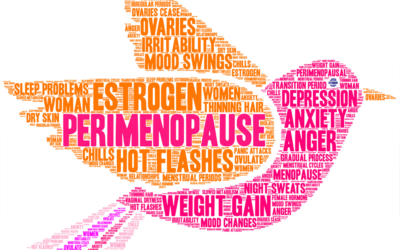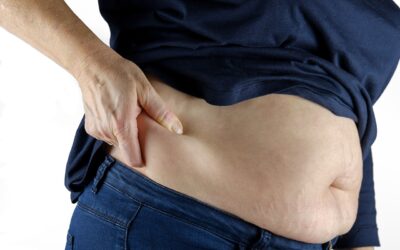

Are You Navigating the Symptoms of Perimenopause?

When I was in my mid-forties I started experiencing a number of seemingly unrelated symptoms – weight gain, brain fog, sore joints, and fatigue. I tried all sorts of one-off fixes – diets, exercise programs, and magic pills – without success. It wasn’t until my period started changing and I experienced hot flashes that the penny dropped and I connected everything to perimenopause. Did it happen like that for you too?
I wonder why there isn’t more talk about perimenopause? After all, it happens to all ladies, although it’s true that some have more challenges with it than others.
Perimenopause (and menopause) is the bookend to puberty, the reproductive part of our lives. So it includes a lot of hormone changes as the reproductive hormones – primarily estrogen and progesterone – naturally decline.
But the real challenge comes with how those changes impact our wellbeing. Like mood swings, inability to sleep, extreme fatigue, joint pain, digestive issues, hot flashes, night sweats, low sex drive and weight gain. What’s up with all that? Why can’t we just wind up our periods and call it a day?
There are two paths for getting help with perimenopause. The medical path and the lifestyle path. Unfortunately, many doctors are not well equipped to help. The American Association of Retired Persons reports most medical schools and residency programs don’t teach physicians in training about menopause. To make matters worse, a recent survey found that just 20% of ob-gyn residency programs provide any kind of menopause training.
When asked, 3 out of 4 ladies reported they did not get adequate treatment when they brought perimenopausal and menopausal concerns to their doctors. And 84% of women say their symptoms interfere with their lives and some are even debilitating.
One of the main areas where doctors should be able to help is in prescribing Hormone Replacement Therapy (HRT). Even though treatment has changed dramatically over the past decade, many doctors are unaware. The new body identical treatment is administered in patches or gel and poses none of the earlier health concerns for breast cancer and heart disease. The topical delivery method means that the liver is completely bypassed, and that absorption through the skin dramatically changes the health risks. Dr. Louise Newson, The Menopause Doctor, goes so far as to encourage women to consider taking body identical HRT for the protections it provides against heart disease, osteoporosis, diabetes and Alzheimer’s.
The other path to get help with the symptoms of perimenopause is through lifestyle. There is a lot that lifestyle habits and behaviors can do to demystify the changes. It turns out the healthy practices of diet and exercise that ladies maintained before perimenopause are unlikely to suit them very well once they enter perimenopause. As our nutrition needs change, so does our digestion. We no longer need all the protein we used to eat, and our sensitivity to sugar and processed foods heightens. Bloating, brain fog, joint pain and weight gain result.
And with hormonal changes to our muscles and joints, the type of exercise and movement that is beneficial also changes. Even if you have always been athletically active, the fatigue and joint pain can make ambitious workouts very difficult. In fact, high impact and anaerobic exercise can cause stress to the system and result in the production of cortisol, the stress hormone. The timing and type of movement you choose take on new importance.
Hormonal changes impact sleep, especially when combined with food choices and stress. So figuring out new sleep hygiene habits are vital to being able to restore the body each night with quality sleep. As we sleep, the body is busy removing dead cells burning fat and rebuilding tissue. The brain catalogues the day’s experiences and builds up memories. Without adequate sleep, the body is stressed when it cannot carry out these maintenance functions and produces cortisol in response. That in turn stimulates appetite, which produces more insulin leading to fat production (and stubbornly stored around the middle). So getting enough good sleep is vital to being able to adapt through the changes of perimenopause.
And finally, mindfulness – getting your head in the game is so important. As it happens, the mind can only focus on one thing at a time. So if you control some of the things you tell yourself and make them positive things, you will benefit from that. Rather than tell yourself that you’re a lazy slob or beat yourself up because you don’t have enough willpower, you tell yourself that you’re an intelligent woman and the goal is achievable. Meditation is a great way to calm the mind, focus on positive things and create endorphins. This can really help to create positivity, reduce cortisol levels and help with sleep.
Are you satisfied with the support your doctor has been giving you for the symptoms of perimenopause? Some symptoms are best resolved using HRT. But many more can be resolved by taking a lifestyle approach.
The beginning of my perimenopausal journey didn’t go well, and I’m determined to help ladies navigate this chapter of their lives so they can take control of the next decades and live their best lives.
To find out how you can navigate the symptoms of perimenopause, click the button to book your free call with Dyna Vink, Health and Nutritional Coach.
Dealing with Menopot – Weight Gain in Perimenopause

Is your waistline expanding? It’s one of the most common symptoms of perimenopause, so you’re not alone. As our bodies change, you will probably find that the things you used to do to shave off a few pounds don’t work anymore. Women discover there is more than a calorie deficit needed to lose weight. What do we need to look at to get rid of the midsection bulge?
Check out these 7 actions:
1. Change Your Sleep Strategies
Poor sleep quality is an extremely common symptom of perimenopause. Waking up unrefreshed means you’re probably feeling too exhausted to head out for exercise, too. And the single most important thing you can do to lose that weight is to get restorative sleep. This makes for a real change from the hectic lives that so many women lead. Balancing work, family and hobbies often results in very short nights. Or, you may try to get a good night’s sleep, but you keep waking up.
Inadequate sleep impacts our hunger hormones, ghrelin and leptin. They don’t work properly without proper sleep and that causes stress to the body which produces cortisol – the stress hormone. There’s basically no way to lose weight if these 3 hormones are unbalanced.
When you sleep, it’s the time when your body does its maintenance. It cleans up and removes debris, it repairs tissue, and it creates memories. So if this maintenance isn’t happening and the hunger and stress hormones are unbalanced, then you will feel terrible, have brain fog and not be able to lose any weight, despite your efforts.
Sleep hygiene habits include the following:
Keep your bedroom cool and dark to prevent night sweats
Choose bamboo fiber for sheets and nightwear
Turn off all screens for at least an hour before sleep
Wear anti-blue light glasses to protect your eyes
Take a cool shower before bed to drop your body temperature
Use a silk pillow cover to keep your head cool (and care for your hair and skin)
Stop eating 4 hours before bed and stop drinking 2 hours before bed
Limit alcohol, preferable none after 5 pm.
Remove caffeine, even decaf.
2. Be Selective About Carbohydrate Intake
Not all nutrients are created equal, and some experts believe that a steady diet heavy in refined carbs like pasta, bread and cereal are a significant factor for excess belly fat. Refined carbs are quickly turned into sugar and that spikes insulin. When insulin is high, there is no fat burning going on.
Much better to get carbohydrates from vegetables. They cause less insulin to be produced and they convert more slowly into glycogen. When combined with healthy fats. Such as extra virgin olive oil, you have a great combination.
3. Choose Fats Wisely
Fat adds flavor, and that makes our food taste great. But there are some fats that are a lot better for you than others. The healthiest fats are the ones that derive from vegetable sources like olives and nuts. Extra virgin olive oil is a great choice because it can be used for cooking and with salad dressings.
If you are eating out, you can ask for oil and vinegar on the side. You can control the portion that way. Confirm that’s it’s olive oil you are getting and not sub quality corn or canola oil.
4. Manage Serving Portions
With a slower metabolism, it’s easy to overeat. So reducing portion size is an important step.
Balance your plate with about 1/4 protein, 1/5 starchy carbohydrate (like sweet potatoes or squash) and ½ vegetables. Arrange things nicely so it looks appetizing and delicious. When you cook your own meals, it’s easier to gauge the serving sizes. But if you’re in a restaurant, not seeing all the courses in front of you at one time can be misleading. Don’t be afraid to ask for a takeaway container for left-overs.
5. Meal Timing
It’s not just what you eat, but also when you eat that counts. Snacks are usually a poor choice at any time of day. Much better to keep your eating to mealtimes. It’s a good idea to stop eating at least 4 hours before bed. This means that your digestion will be largely complete before bed so you can sleep restfully. Another great idea is to eat the main meal of the day at lunch time, and have a smaller meal at dinner.
Some people like to incorporate intermittent fasting to their eating plan. Using this approach, you can limit your eating window to anything from 4-12 hours a day. This means that your digestion will not be distracting your body from other important functions.
6. Join a Friend or a Group for Exercise
It’s a great idea to vary your movement routines to include different activities. Generally you want both aerobic exercise – like walking, swimming or dancing – as well as resistance exercise – like yoga and light weight lifting. While a variety of activity is great, finding a friend to do it with introduces accountability and community. Studies have found that participating in regular group fitness classes resulted in a significant decrease in stress and a rise in physical, mental, and emotional quality of life compared with exercising regularly on your own or not engaging in regular exercise at all.
7. Reduce Stress with Mindfulness
Cortisol is known as the stress hormone. It stimulates the liver to increase production and release of blood sugar and helps the body convert fats, proteins, and carbohydrates into usable energy. We need cortisol as part of the body’s “fight or flight” response, so it’s released during stressful times to give your body a natural energy boost. But when cortisol levels are constantly high because of chronic stress, these same effects are likely to turn into insulin resistance and then type 2 diabetes.
To break the cycle, you want to reduce stress using some quick and simple techniques to help calm you down. For example, go for a walk, enjoy the outdoors. Try a meditation app like Headspace or Calm. They offer free short meditations for beginners that can lower heart rate and short-circuit the stress response. You can reduce or eliminate alcohol. That beverage doesn’t serve your body, only challenges it with sugars, and prevents the liver from metabolizing fat.
If you are dealing with emotional issues, it may result in overeating and self-sabotage. If this is the case, then find help with a therapist.
#lifestyleapproach#perimenopause#menopause#weightgain#wellness#holistichealth

Holistic Nutrition Lifestyle | Copyright © 2025 | All Rights Reserved
“This site is not a part of the Facebook website or Facebook Inc. Additionally, this site is NOT
endorsed by Facebook in any way.
FACEBOOK is a trademark of FACEBOOK, Inc.”